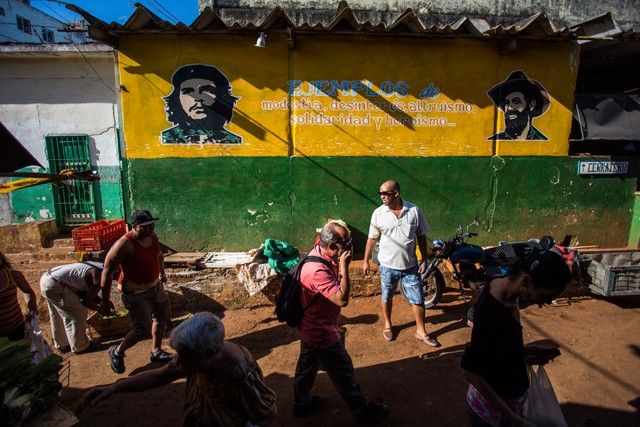Weeping, hopeful, Cubans look to future without Fidel Castro

HAVANA — Music fell silent, weddings were canceled and people wept in the streets Saturday as Cubans faced their first day without the leader who steered their island to both greater social equality and years of economic ruin.
Across a hushed capital, dozens of Cubans said they felt genuine pain at the death of Fidel Castro, whose words and image had filled schoolbooks, airwaves and front pages since before many were born. And in private conversations, they expressed hope that Castro's passing will allow Cuba to move faster toward a more open, prosperous future under his younger brother and successor, President Raul Castro.
Both brothers led bands of bearded rebels out of the eastern Sierra Maestra mountains to create a communist government 90 miles from the United States. But since taking over from his ailing brother in 2006, the 85-year-old Raul Castro has allowed an explosion of private enterprise and, last year, restored diplomatic relations with Washington.
"Raul wants the country to advance, to do business with the whole world, even the United States," said Belkis Bejarano, a 65-year-old homemaker in central Havana. "Raul wants to do business, that's it. Fidel was still holed up in the Sierra Maestra."
In his twilight years Fidel Castro largely refrained from offering his opinions publicly on domestic issues, lending tacit backing to his brother's free-market reforms. But the older Castro surged back onto the public stage twice this year — critiquing President Barack Obama's historic March visit to Cuba and proclaiming in April that communism was "a great step forward in the fight against colonialism and its inseparable companion, imperialism."
Ailing and without any overt political power, the 90-year-old revolutionary icon became for some a symbol of resistance to his younger sibling's diplomatic and economic openings. For many other Cubans, however, Fidel Castro was fading into history, increasingly at a remove from the passions that long cast him as either messianic savior or maniacal strongman.
On Saturday, many Cubans on the island described Fidel Castro as a towering figure who brought Cuba free health care, education and true independence from the United States, while saddling the country with an ossified political and economic system that has left streets and buildings crumbling and young, educated elites fleeing in search of greater prosperity abroad.
"Fidel was a father for everyone in my generation," said Jorge Luis Hernandez, a 45-year-old electrician. "I hope that we keep moving forward because we are truly a great, strong, intelligent people. There are a lot of transformations, a lot of changes, but I think that the revolution will keep on in the same way and always keep moving forward."
In 2013, Raul Castro announced that he would step aside by the time his current presidential term ends in 2018, and for the first time named an heir-apparent not from the Castro's revolutionary generation — Miguel Diaz-Canel, 56.
Fidel Castro's death "puts a sharper focus on the mortality of the entire first generation of this revolution," said Philip Peters, a Cuba analyst and business consultant, "and brings into sharper focus the absence of a group of potential leaders that's ready to take over and politically connected to the public."
For Cubans off the island, Castro's death was cause for celebration. In Miami, the heart of the Cuban diaspora, thousands of people banged pots with spoons, waved Cuban and U.S. flags in the air and whooped in jubilation.
"We're not celebrating that someone died, but that this is finished," said 30-year-old Erick Martinez, who emigrated from Cuba four years ago.
The Cuban government declared nine days of mourning for Castro, whose ashes will be carried across the island from Havana to the eastern city of Santiago in a procession retracing his rebel army's victorious sweep from the Sierra Maestra to Havana. State radio and television were filled with non-stop tributes to Castro, playing hours of footage of his time in power and interviews with prominent Cubans affectionately remembering him.
Bars shut, baseball games and concerts were suspended and many restaurants stopped serving alcohol and planned to close early. Official newspapers were published Saturday with only black ink instead of the usual bright red or blue mastheads.
Many Cubans, however, were already imagining the coming years in a Cuba without Fidel Castro.
"Fidel's ideas are still valid," said Edgardo Casals, a 32-year-old sculptor. "But we can't look back even for a second. We have to find our own way. We have to look toward the future, which is ours, the younger generations'."
- Latest
- Trending
































